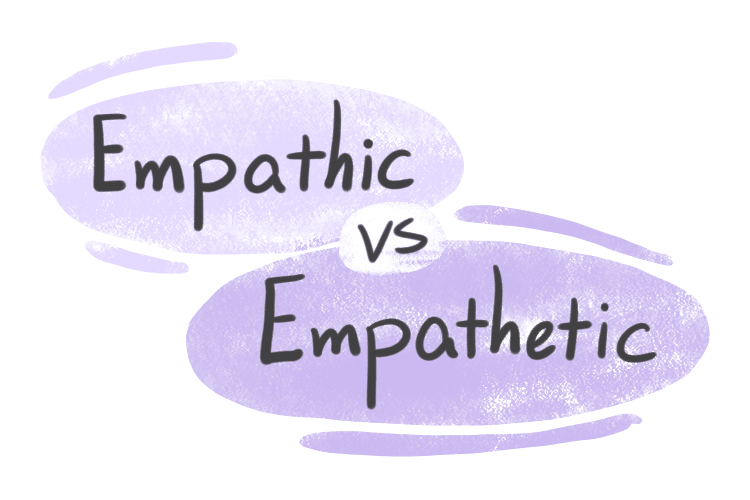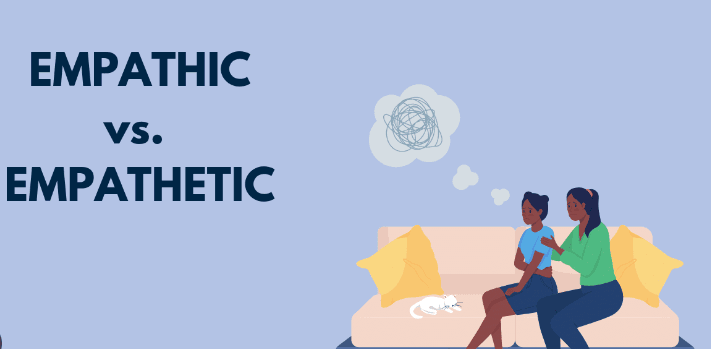Empathic vs Empathetic: A Guide for Understanding Emotional Intelligence

Many English learners in India struggle with telling apart similar words. For instance, they often mix up 'empathic' and 'empathetic'. Knowing the difference between similar words can help you communicate more clearly.
In the following sections, we'll look into these two terms and their usage in various contexts. Along the way, we’ll also provide tips on how to use them effectively in everyday conversation. Let's get started.
What Does Empathic Mean in English?
'Empathic' is derived from the root word 'empathy'. It originates from the Greek words 'em' (in) and 'pathos' (feeling or suffering). It describes a person's ability to understand and share the feelings of others.
Synonyms for empathic include:
Sympathetic
Compassionate
Understanding
Sensitive
Here are some sentences illustrating its usage:
As an empathic listener, she could easily understand her friend's problems.
His empathic response to the situation showed his maturity.
What Does Empathetic Mean in English?
Continuing our exploration of empathic vs empathetic definition, let's look at 'empathetic'.
'Empathetic' also originates from the Greek word for empathy. 'Empathetic' is often used interchangeably with 'empathic'. But language experts make slight distinctions between the two.
"Empathetic" describes someone who regularly demonstrates empathy or possesses empathic qualities.
Synonyms for empathetic include:
Concerned
Feeling
Responsive
Caring
Consider these sentences showing its proper use:
She gave an empathetic nod, acknowledging his feelings.
The empathetic teacher provided extra support to the struggling students.
Is There A Difference Between Being Empathic And Empathetic?
Empathic vs empathetic meaning is a common point of confusion among Indian learners. Both come from "empathy" but are used in different ways. Some think they can be swapped, but a small difference adds richness to your English.
Consider this table for a better understanding:
Term | Definition |
Empathy | Understanding and sharing another person's feelings |
Sympathy | Feeling sorry for someone else's misfortune |
Empathic | Refers to cognitive empathy, understanding what others feel |
Empathetic | Refers to emotional empathy, feeling what others feel |
For example, your friend talks about a tough day at work. And your response is "empathic" means you understand and acknowledge their feelings. But if your response is "empathetic," it means you not only understand but also feel their stress as if it's your own.
Why is Understanding Empathic vs Empathetic Important for English Learners in India?

As English learners, you must have come across the terms 'empathic' and 'empathetic'. It's important to understand their meanings for effective communication and to avoid misinterpretation.
For instance, the term 'empathic' implies an ability to understand another's feelings. While 'empathetic' refers to sharing those feelings.
Here are two situations where incorrect usage can lead to confusion:
In a job interview: Using these words wrongly can make you look not very proficient. It can also affect your chances of getting the job.
Social interactions: Incorrect usage might lead to misunderstandings, especially in emotionally charged conversations.
For more such challenging words and terms, check out Clapingo's blogs and videos.
How Can You Improve Your Usage of 'Empathic' and 'Empathetic'?
Here are three steps to help you understand these words better:
Know the difference:
'Empathic' is about understanding others' emotions deeply, especially in psychology. 'Empathetic' is more about sharing feelings in everyday relationships.
Practice in conversations:
Use both words in different situations to see how they fit. For example, "As a psychologist, I need to be empathic" versus "As his friend, she was empathetic to his problems".
Learn with Clapingo:
Clapingo's spoken English courses for Indian learners cover these tricky words in detail.
Final Thoughts
Knowing the distinction between "empathic" and "empathetic" can be crucial for English learning. 'Empathic' means understanding someone's feelings without feeling them yourself. 'Empathetic' is about feeling what the other person feels.
Regular practice of these skills will enhance your vocabulary and emotional understanding. This is beneficial in both personal and professional contexts.
Learning English isn't just about knowing words and rules. It's also about expressing thoughts and emotions clearly and accurately. Take a quick demo and start your English learning journey with Clapingo!
FAQs
1. What does ‘empathic’ mean?
'Empathic' refers to someone who can sense and understand other people's feelings. If you're an empathic person, you're good at picking up subtle cues that reveal how others are feeling. You're able to put yourself in another person's shoes and feel what they're going through.
2. How does ‘empathetic’ differ from ‘empathic’?
'Empathetic' may seem very similar to 'empathic', as both refer to the ability to understand others' feelings. However, being empathetic usually involves a stronger emotional response. It's not just about understanding someone else’s emotions, but also sharing them.
3. Can I interchangeably use ‘empathic’ and ‘empathetic’ in my conversations?
In casual conversation, people often use 'empathetic' and 'empathic' interchangeably without confusion. But for formal or professional writing clarity matters. It's crucial to pick the right word based on their slight differences. 'Empathic' is about understanding emotions, while 'empathetic' means a stronger emotional connection.
Comments
Your comment has been submitted